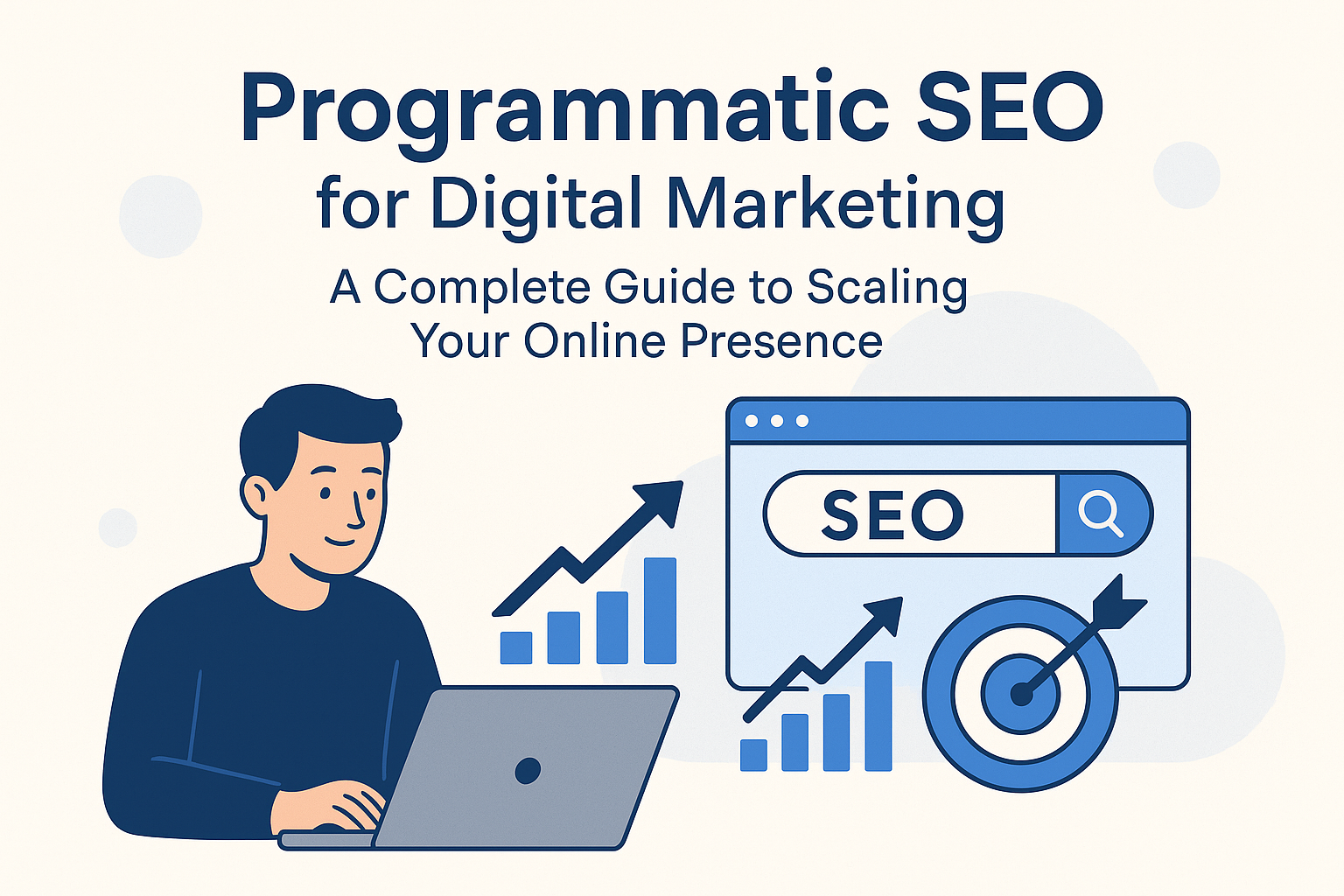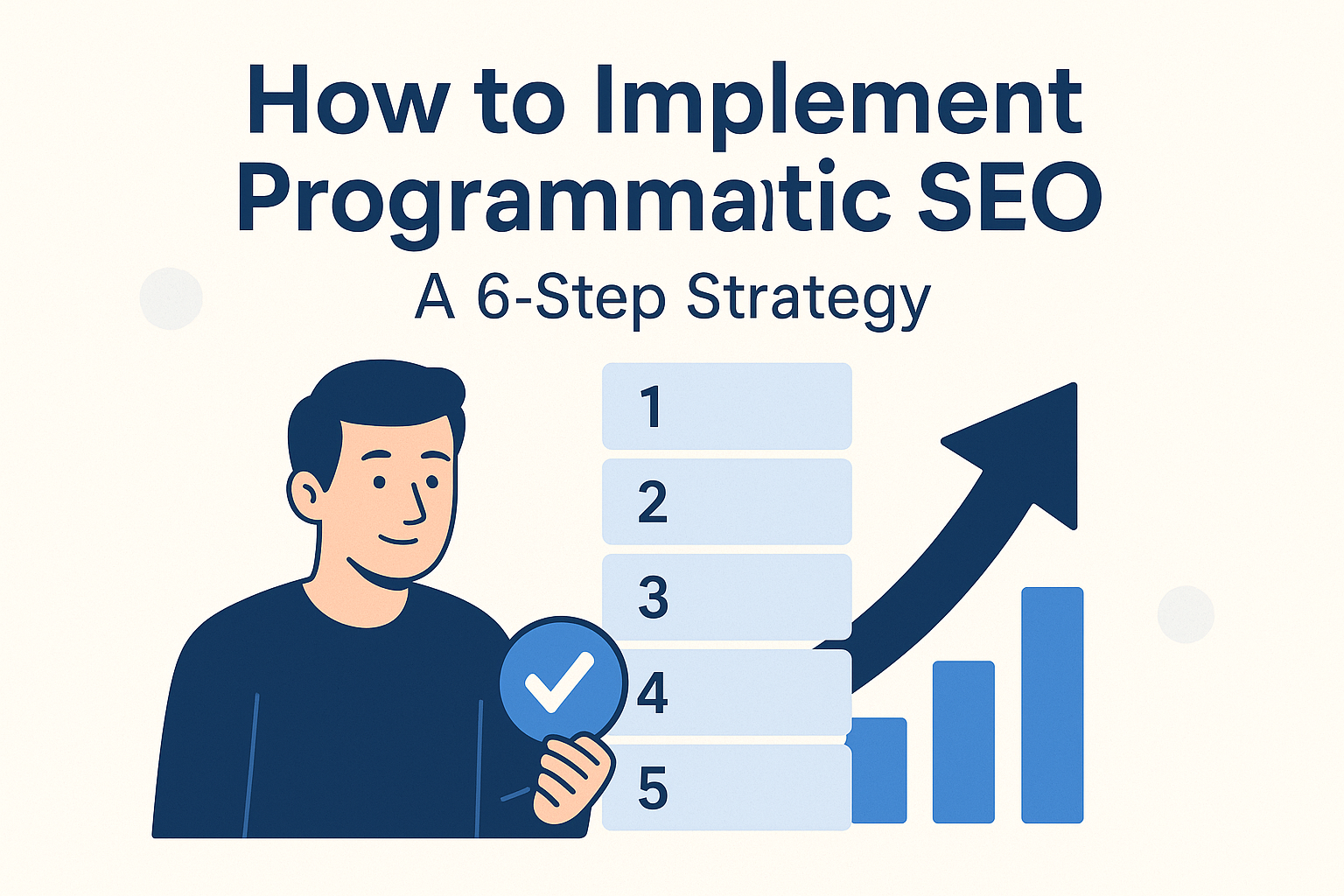
As the leading digital marketing company in Delhi, we at Nexus It Solutions understand that staying ahead in the digital landscape requires innovative strategies. One approach that’s revolutionizing how businesses approach SEO is programmatic SEO. In this comprehensive guide, we’ll explore what programmatic SEO is, how it can benefit your business, and provide actionable steps to implement it effectively.
What Is Programmatic SEO?
Programmatic SEO refers to the automated creation of keyword-targeted pages at scale. It involves using templates and data to generate hundreds or thousands of pages that target specific search queries. This approach allows businesses to capture traffic from long-tail keywords without manually creating each page.
Unlike traditional SEO, which might focus on a handful of high-competition keywords, programmatic SEO targets a vast array of specific search terms, often with lower competition but highly targeted intent.
Why Programmatic SEO Matters for Your Business
In today’s competitive digital landscape, programmatic SEO offers several key advantages:
- Scalability: Create thousands of pages targeting specific keywords without proportionally increasing your workload
- Long-tail keyword dominance: Capture traffic from highly specific search queries that your competitors might overlook
- Improved user experience: Provide visitors with exactly the information they’re searching for
- Cost-effective growth: Generate more organic traffic without increasing your marketing budget proportionally
6 Successful Programmatic SEO Examples to Inspire You
1. Wise (Currency Conversion)
Wise (formerly TransferWise) has created thousands of currency conversion pages targeting specific currency pairs. Each page includes:
- Conversion calculators for specific currency pairs
- Historical rate data
- Comparison with competitor rates
- Educational content about the currencies
This approach has helped Wise generate millions of monthly visitors searching for currency conversion information.
2. Yelp (Local Business Listings)
Yelp uses programmatic SEO to create location-specific pages for businesses across different categories. Their strategy includes:
- Automatically generated pages for businesses with user reviews and ratings
- Location-specific category pages (e.g., “Restaurants in Delhi”)
- Dynamic meta tags based on business name, category, and location
- Extensive use of schema markup for rich snippets in search results
3. Zapier (App Integration)
Zapier has leveraged programmatic SEO to create thousands of integration pages. Their approach includes:
- Creating dedicated pages for each possible app integration
- Showcasing specific workflows and use cases
- Providing step-by-step setup instructions
- Including user testimonials and examples
This strategy has helped Zapier increase their organic traffic by nearly 300%.
4. TripAdvisor (Travel Destinations)
TripAdvisor creates programmatic content for countless destinations, hotels, and attractions. Their pages include:
- Location-specific “Things to Do” pages
- User-generated reviews and ratings
- Booking information and pricing
- Related attractions and accommodations
5. Airbnb (Accommodation Listings)
Airbnb’s programmatic SEO strategy includes:
- Location-based accommodation pages
- Property type pages (e.g., “Swimming pools in Delhi”)
- Amenity-focused pages (e.g., “Delhi rentals with pools”)
- Dynamic internal linking between related pages
6. Amazon (Product Listings)
Amazon uses programmatic SEO for millions of products through:
- Dynamic product pages with descriptions, specifications, and reviews
- Algorithmic internal linking for related products
- Extensive schema markup for rich snippets
- Category and subcategory pages that target specific search intents
How to Implement Programmatic SEO: A 6-Step Strategy

1. Identify Scalable Keyword Opportunities
Start by finding keyword patterns that can be scaled across many variations:
Use tools like SEMrush to identify long-tail keywords in your industry
Look for patterns where a base keyword can be combined with modifiers
Focus on keywords with clear search intent that align with your business offerings
For example, if you’re a marketing agency, you might target variations like:
- “Digital marketing for [industry]”
- “[Service] agency in [location]”
- “[Software] alternatives for [business type]”
2. Create a Structured Template
Design a template that can be populated with different data while maintaining a consistent structure:
- Develop a clear hierarchy with H2 and H3 headings
- Include sections that can be customized for each keyword variation
- Ensure the template provides genuine value to users
- Include conversion elements like CTAs and lead forms
3. Gather and Organize Your Data
Collect the data needed to populate your templates:
- Use internal data from your business operations
- Leverage public data sources (ensuring proper attribution)
- Consider APIs for real-time data integration
- Create a database (using tools like Airtable or Google Sheets) to organize your information
4. Build a Content Generation System
Develop a system to combine your template with your data:
- For smaller projects, spreadsheet formulas can help generate content
- For larger implementations, consider working with developers to create a custom solution
- Use CMS platforms like WordPress with plugins like WP All Import
- Ensure your system can handle updates when data changes
5. Implement Strong Internal Linking
Create a logical structure for your programmatic pages:
- Develop pillar pages that link to related programmatic pages
- Ensure each programmatic page links back to relevant category pages
- Create a hierarchical structure that helps both users and search engines navigate your content
- Use descriptive anchor text that includes target keywords
6. Monitor Performance and Optimize
Track the performance of your programmatic pages and make improvements:
- Use Google Analytics to identify high and low-performing pages
- Check indexation status regularly in Google Search Console
- Update content based on user engagement metrics
- Expand your programmatic content to target additional keyword variations
Common Programmatic SEO Pitfalls to Avoid
While programmatic SEO can be powerful, there are several potential issues to watch out for:
- Thin content: Ensure each page provides unique value beyond just changing a few words
- Duplicate content issues: Use canonical tags appropriately to avoid duplicate content penalties
- Poor user experience: Focus on creating pages that genuinely help users, not just search engines
- Indexation problems: Monitor Google Search Console to ensure your pages are being indexed
- Outdated information: Implement systems to keep your data fresh and accurate
Tools to Power Your Programmatic SEO Strategy
Several tools can help you implement programmatic SEO effectively:
- Keyword research: SEMrush, Ahrefs, or Google Keyword Planner
- Data management: Airtable, Google Sheets, or custom databases
- Content generation: Webflow CMS, WordPress with WP All Import, or custom solutions
- Web scraping: Clay (for gathering third-party data)
- Workflow automation: Zapier (for connecting your data sources to your CMS)
- Performance tracking: Google Analytics and Google Search Console
Is Programmatic SEO Right for Your Business?
Programmatic SEO works best for businesses that:
- Have access to unique, valuable data
- Target keywords with predictable patterns
- Can provide genuine value across many similar topics
- Have the technical resources to implement and maintain the system
At Nexus It Solutions, we help businesses determine if programmatic SEO is the right approach and develop customized strategies that align with their goals and resources.
Ready to Scale Your SEO Strategy?
Programmatic SEO represents a powerful opportunity to scale your organic traffic and reach new audiences. By following the steps outlined in this guide, you can create a content strategy that targets thousands of valuable keywords while providing genuine value to your users.
As Delhi best digital marketing company, Nexus It Solutions specializes in implementing cutting-edge SEO strategies, including programmatic approaches. Our team of experts can help you identify opportunities, develop templates, gather data, and create a system that generates valuable content at scale.
Ready to transform your SEO strategy? Contact us today for a consultation and discover how programmatic SEO can help your business grow.